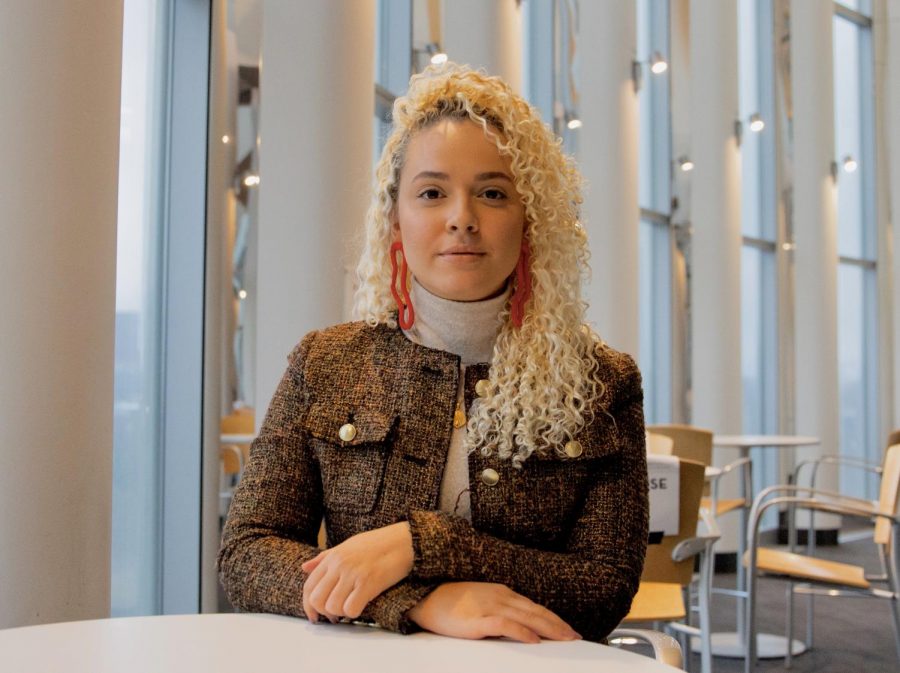In Brazil, University of Minnesota graduate student Karla Godoy da Costa Lima said many women feel unseen in society.
Growing up in a favela in Pernambuco, Brazil, Godoy da Costa Lima said societal conditions in her country often limit women’s abilities to go to college or have the financial stability to pursue their own dreams and support their families.
Godoy da Costa Lima said she wanted to find a way to reduce poverty among women.
At 16 she became a chief marketing officer for Life UP, a software development startup designed to aid people with physical disabilities. In 2018 she founded EcoCiclo, a startup designed to make Brazil’s first biodegradable sanitary pads. Now she’s at the University’s Humphrey School of Public Affairs working on her second master’s degree at age 24, with plans to launch EcoCiclo products by August.
Brazil’s first biodegradable pad
Once sitting at a table on a lunch break with friends back in Brazil, Godoy da Costa Lima said she started discussing periods and cramps with some of her peers. Her male friends were visibly uncomfortable with the topic, something that frustrated Godoy da Costa Lima.
“We are in the 21st century, how [can] you listen to that? How [do] you still feel uncomfortable talking about natural situations that you know that [happen],” she said.
Around the world, menstrual poverty is a problem for many women, who sometimes cannot find menstrual products that are safe, affordable and comfortable.
Menstrual products also contribute greatly to plastic waste. In their lifetime, a person who menstruates can use 10,000 to 50,000 sanitary pads and tampons. A typical pad takes up to 500 years to decompose, Godoy da Costa Lima said.
Although there are eco-friendly alternatives, like reusable pads or menstrual cups, Godoy da Costa Lima said many of these are not practical for women living in places like Brazil who do not have access to running water or a private bathroom.
“During interviews, we talked with our customer base. They told us that what is practical is not sustainable, and what’s sustainable is not practical,” she said. “We said, ‘Okay, we have to make something practical and sustainable at the same time.'”
EcoCiclo’s products look like typical sanitary pads but are made with cotton and a biodegradable liner rather than plastic. They will also be produced by Brazilian women living in low-income areas and favelas of Brazil.
The pads will also come in different sizes and be sold in packages of eight, she said. Godoy da Costa Lima plans to develop tampons in the future, and work to make these products more affordable — the current price is three times the cost of a typical Brazilian pad, she said.
Developing a virtual marketplace
Centric to Godoy da Costa Lima’s vision is the creation of a virtual marketplace, which her team will launch in partnership with Inter-American Development Bank on May 8. Here, Brazilian women will have a platform to buy and sell homemade sustainable products, including clothing, hair and body oils, flowers, plants and other goods. Godoy da Costa Lima’s pads will be available on the site by August.
“EcoCiclo is modal. It’s just the beginning,” she said. “Taking care of nature is also taking care of people.”
Godoy da Costa Lima said giving women a platform to share their products in turn will make them more financially independent, on top of supporting the environment and moving away from single-use items and plastics.
“We connect women to other women. We try to create this community that pushes women forward. And it’s really good to feel that, because even though we’re not selling anything yet, I can feel like they’re rooting for us, they want to buy our products, because they know our story,” she said. “They know what we do. And it feels awesome.”
Changemaker
Aibi Sasore served as a mentor for Godoy da Costa Lima when she participated in the Global Youth Advancement Network Summit organized by Michigan State University in 2019.
“I was fascinated by, first of all, all the work they were doing. They’re creating a biodegradable sanitary towel for women, and their project straddles so many sectors. It was reproductive health, economic empowerment, environmental sustainability,” Sasore said.
In Brazil, women make up 40% of their family’s breadwinners. When women are given the tools necessary to succeed, a ripple effect of empowerment and financial stability follows, Sasore said.
“Karla inspires me,” she said. “One of the things that makes Karla remarkable is that she’s the first person to go to college in her family, and she’s currently doing her second master’s degree. And so just from doing that it’s almost a given that her children and her grandchildren will go to college, and have some kind of postgraduate education. So if you can just break that cycle with one woman, the effect across the community and, also, to future generations, will be great.”
Godoy da Costa Lima said the support of the other women in her life has helped her become the strong woman she is today.
“I think EcoCiclo is like a daughter to me,” Godoy da Costa Lima said. “I love that I’m trying to reduce the impact that we cause on Earth. I love that we’re trying to reduce poverty among women. And I think that it’s what I was born to do.”















Francisco Fabiano
Apr 23, 2021 at 7:12 pm
Essa mulher é capaz de mover o mundo!